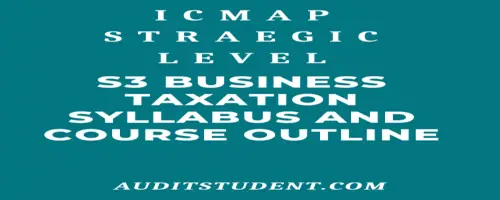Get access to latest and updated syllabus ofS3 Business Taxation now. Here you will find detailed course content or Syllabus of Business Taxation for upcoming attempt.
Now you know what topics to study and practice .The next step would be to download the latest official Business Taxation Study Text. Click
to Download.
Syllabus GRID:
Here is the grid for Syllabus of S3 Business Taxation.
| GRID | WEIGHTAGE |
| INCOME TAX 1. Income Tax Ordinance, 2001 2. Income Tax Rules, 2002 | 60% |
| SALES TAX 3. The Sales Tax Act, 1990 4. The Sales Tax Rules, 2006 | 30% |
| FEDERAL EXCISE 5. Federal Excise Act and Rules | 10% |
| TOTAL | 100% |
Detailed Syllabus Contents:
The detailed Syllabus of Business Taxation for upcoming attempt is given below.
PART – A
INCOME TAX
1. Income Tax Ordinance, 2001
- Definitions;
- Charge to tax;
- Tax on taxable income (computation of income from salary, property, business, capital gains, other sources, exemptions, losses, deductible allowances, tax credits);
- Common rules (general, tax year, assets);
- Provisions governing persons (concept, individuals, aop, companies);
- Special industries (insurance, oil & gas and other mineral deposits);
- International (geographical source of income, taxation of foreign source of income of residents, taxation of non-residents, double taxation);
- Anti-avoidance;
- Minimum tax;
- Procedures (returns, assessments, appeals, collection and recovery of tax, payments and deductions, refunds, records and audit, penalty, offence and prosecutions, additional tax);
- Administration (general, transitional advance tax provisions, miscellaneous);
- Schedules (first schedule, second schedule, third schedule, sixth schedule, seventh schedule).
- Special provisions regarding depreciation,
- Initial allowance,
- Intangibles, pre-commencement expenses,
- Scientific research expenditures,
- Employees training and facilities,
- Profit on debt,
- Financial costs and lease payment,
- Bad debts,
- Provisioning regarding consumer loans,
- Profit on non- performing debts,
- Transfer to participating reserve and tax accounting.
- Nature and areas of tax management;
- Deduction of tax at source;
- Advance payment of tax;
- Minimum tax;
- Importance of tax management while claiming allowance;
- Exemptions
- Deductions and tax credits;
- Filing of returns of income;
- Defaults and penalties.
- Capital gain tax
2. Income Tax Rules, 2002
- Definitions related to the rules;
- Heads of income;
- Income of residents;
- Tax of non-residents;
- Transfer pricing;
- Records and books of accounts;
- Certificates;
- Advance tax collection or deduction,
- Payment,
- Statements of tax collected or deducted.
- Income tax recovery rules,
- Registration of income tax practitioners,
- Recognized terminal benefits funds.
PART – B
Sales Tax
3. The Sales Tax Act, 1990
- Chapter No. I, II, III, IV, V, VII, VIII and IX of the Act, as amended up-to-date covering;
- Definitions;
- Scope and payment of tax;
- Registration;
- Book-keeping and invoicing requirements;
- Returns;
- Offences and penalties, appeals and recovery of arrears.
4. The Sales Tax Rules, 2006
- Definitions related to rules.
- Registration, compulsory registration
- De-registration, filing of returns,
- Credit and debit note
- Destruction of goods,
- Apportionment of input tax,
- Refund,
- Supply of zero-rated goods to diplomats,
- Diplomatic missions,
- Privileged persons and privileged organizations,
- Taxpayer’s authorized representatives,
- Alternative dispute resolution,
- Special procedure for issuance of electronic sales tax invoices between buyers and sellers
PART – C
Indirect Tax
5. Federal Excise Act and Rules
- Federal Excise Act, 2005(Chapter I & II only)
- Notifications, rules general orders and circulars, issued under the Federal Excise Act, 2005 relevant of Chapter I & II only.
LEARNING OUTCOMES
On completion of this course, students will be able to:
- Understand the objectives of levy of taxation, and its basic concepts
- Comprehend the system of taxation in Pakistan
- Explain provisions of Income Tax Laws mainly relevant to individuals and association of persons and corporate entities
- Understand features of the direct and indirect taxes;
- Execute record-keeping, filing and tax payment requirements of principal types of taxation, relating to business;
- Recommend the management on issues, pertaining to tax liabilities of company or firm, arising from various types of income.
- Elucidate relevant Sales Tax Laws and rules
- Understand the underlying concepts of Federal Excise Act and Rules
syllabus ofS3 Business Taxation syllabus:
syllabus ofS3 Business Taxation syllabus ofS3 Business Taxation syllabus ofS3 Business Taxation syllabus ofS3 Business Taxation syllabus ofS3 Business Taxation syllabus ofS3 Business Taxation